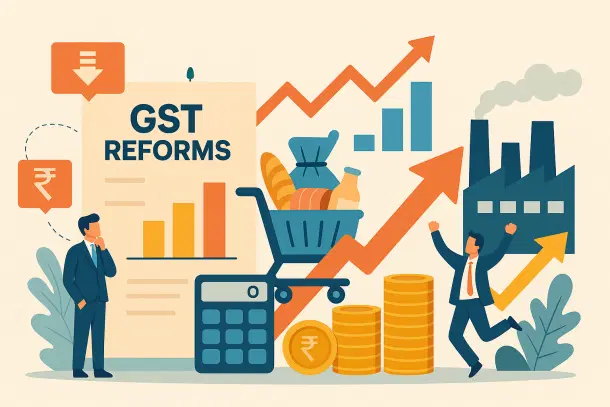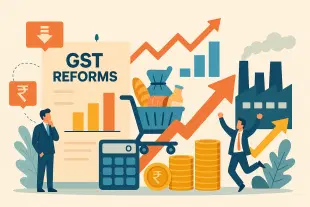News Brief
India Clears Major GST Reforms: Simplified Regime With Two Slabs Of 5 Per Cent And 18 Per Cent To Begin 22 September— All About It
Swarajya Staff
Sep 03, 2025, 11:30 PM | Updated 11:37 PM IST
Save & read from anywhere!
Bookmark stories for easy access on any device or the Swarajya app.


The Goods and Services Tax (GST) Council on Wednesday (3 September) approved a set of reforms intended to simplify the tax structure, reduce costs for households, and support sectors including health, agriculture, and manufacturing.
The decisions came at the Council’s 56th meeting in New Delhi, chaired by Finance Minister Nirmala Sitharaman.
Two-Rate GST Structure
The Council endorsed a shift from the existing four-tier system to a simplified model with a standard rate of 18 per cent and a merit rate of 5 per cent.
A special de-merit rate of 40 per cent will apply to products such as tobacco, pan masala, and sugary drinks.
Exemptions for Insurance Policies
All individual life and health insurance policies, including family floater and senior citizen plans, will now be exempt from GST.
The measure is aimed at expanding coverage and making insurance more affordable.
Cuts on Food and Household Goods
Common items including UHT milk, paneer, chapati, roti, and parotta will be taxed at nil rate.
Toiletries, bicycles, soaps, shampoos, kitchenware, and packaged foods such as noodles, chocolates, sauces, and coffee will fall into the 5 per cent category, down from 12 or 18 per cent.
Zero GST on Lifesaving Medicines
Thirty-three drugs used for the treatment of cancer, rare and chronic diseases will be fully exempt.
Most other medicines will attract 5 per cent GST, reduced from 12 per cent.
GST has also been reduced on anaesthetics, iodine, medical oxygen, diagnostic kits, bandages, glucometers, spectacles, surgical instruments and X-ray apparatus.
Reductions for Cement, Automobiles, and Textiles
GST on cement has been cut from 28 to 18 per cent.
Small cars, motorcycles up to 350cc, buses, trucks, and ambulances will also move to 18 per cent from 28.
In textiles, rates on man-made fibre and yarn have been reduced to 5 per cent, addressing long-standing inverted duty concerns.
Support for Agriculture and Renewable Energy
Agricultural machinery such as tractors, harvesters, irrigation equipment, and composting machines will now be taxed at 5 per cent.
Renewable energy devices including solar panels, wind turbines, and fuel-cell vehicles will also shift from 12 to 5 per cent.
GST Appellate Tribunal to Begin Hearings in December
The Goods and Services Tax Appellate Tribunal will be made operational by the end of September and start hearings before December.
A deadline of 30 June 2026 has been set for clearing backlog appeals.
Implementation from 22 September
The revised rates will come into effect from 22 September 2025. Tobacco and related products will remain at current rates until outstanding liabilities under the compensation cess are met.
Please click here to add Swarajya as your preferred and trusted news source on Google.
Also Read: GST 2.0 Will Strengthen Revenue Collections, Keep States As Net Gainers: SBI Report





